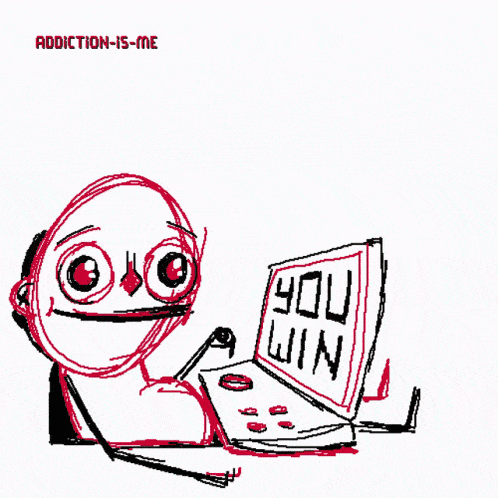When you're not playing, do you think about when you can do it again?
Advertisement - Scroll to continue
Do you have severe headaches?
How much time a day do you spend on gaming?
Do you have problems at school or at work caused by gaming?
Do you enjoy doing something besides gaming?
Do you skip meals and sleep because of computer games?
Advertisement - Scroll to continue
How do you react when your internet connection is disconnected?
Do you stay up at night just to play longer?
How do you feel when you can't play?
Do your eyes hurt after getting up from the computer?
Can you control the time you spend playing?
Advertisement - Scroll to continue
Do you spend more time than before playing video games to gain satisfaction?
Do you postpone meetings or other things in order to play?
How do you react when you lose?
What do you think about video games?
Do you have trouble focusing on anything other than games?
Advertisement - Scroll to continue
What do you most often talk to your friends about?
Do your loved ones blame you for not spending enough time with them?
After you finish playing, do you still think about the game and the scenes that took place there?
Do you use every available moment to play?




Hey everyone! Are you fans of video games? Or maybe you’re here because you want to see if your love for games has turned into an obsession? Do you spend too much time at the computer? Or maybe your relatives are worried that you are not leaving your room? Answer the questions in this quiz honestly and see if they overdo it or if you should take a closer look at the problem. Let’s talk about video game addiction today.
Video game addiction (VGA), also known as gaming disorder or internet gaming disorder, is generally defined as the problematic, compulsive use of video games that significantly impairs an individual’s ability to function in various life domains over a prolonged period. This and associated concepts have been the subject of considerable research, debate, and discussion among experts in several disciplines and have generated controversy within the medical, scientific, and gaming communities. Such disorders can be diagnosed when an individual engages in gaming activities at the cost of fulfilling daily responsibilities or pursuing other interests without regard for the negative consequences. As defined by the ICD-11, the main criterion for this disorder is a lack of self-control over gaming.
The World Health Organization included gaming disorder in the 11th revision of its International Classification of Diseases (ICD). The American Psychiatric Association (APA), while stating there is insufficient evidence for the inclusion of Internet gaming disorder in the Diagnostic and Statistical Manual of Mental Disorders in 2013, considered it worthy of further study.
The controversy around the diagnosis includes whether the disorder is a separate clinical entity or a manifestation of underlying psychiatric disorders. Research has approached the question from various viewpoints, with no universally standardized or agreed definitions, leading to difficulties in developing evidence-based recommendations.
In its report, the Council on Science and Public Health to the American Medical Association (AMA) used this two-hour-per-day limit to define “gaming overuse”, citing the American Academy of Pediatrics guideline of no more than one to two hours per day of “screen time”. However, the ESA document cited in the Council report does not contain the two-hour-per-day data.
While the American Psychiatric Association (APA) does not recognize video game addiction as a disorder, in light of existing evidence, the organization included video game addiction as a “condition requiring further study” in the DSM-5 as an Internet gaming disorder. Video game addiction is a broader concept than internet gaming addiction, but most video game addiction is associated with internet gaming. APA suggests, like Khan, that the effects (or symptoms) of video game addiction may be similar to those of other proposed psychological addictions. Video game addiction may be an impulse control disorder, similar to compulsive gambling. The APA explains why Internet Gaming Disorder has been proposed as a disorder. This decision was based upon many studies of this condition and the severity of its consequences. Because of the distinguishing features and increased risks of clinically significant problems associated with gaming, in particular, the Workgroup recommended the inclusion of only internet gaming disorder in Section 3 of the DSM-5.
Some players become more concerned with their interactions in the game than in their broader lives. Players may play many hours per day, neglect personal hygiene, gain or lose significant weight, disrupt sleep patterns resulting in sleep deprivation, play at work, avoid phone calls from friends, or lie about how much time they spend playing video games.
The APA has developed nine criteria for characterizing the proposed Internet Gaming Disorder. You can ask yourself these questions to decide if you may suffer from gaming addiction. Do you spend a lot of time thinking about games even when you are not playing or planning when you can play next? Do you feel restless, irritable, moody, angry, anxious, or sad when attempting to cut down or stop gaming, or when you are unable to play? Do you feel the need to play for increasing amounts of time, play more exciting games, or use more powerful equipment to get the same amount of excitement you used to get? Do you feel that you should play less, but are unable to cut back on the amount of time you spend playing games? Do you lose interest in or reduce participation in other recreational activities due to gaming? Do you continue to play games even though you are aware of negative consequences, such as not getting enough sleep, being late to school/work, spending too much money, having arguments with others, or neglecting important duties? Do you lie to family, friends, or others about how much you game, or try to keep your family or friends from knowing how much you game? Do you game to escape from or forget about personal problems, or to relieve uncomfortable feelings such as guilt, anxiety, helplessness, or depression? Do you risk or lose significant relationships, jobs, educational or career opportunities because of gaming?
Are you addicted to gaming? Answer the twenty questions we have prepared. They can help you determine if there is anything to worry about. This quiz is not a substitute for a medical diagnosis. For reliable information and help, go to a specialist. This can significantly improve the quality of your life.
